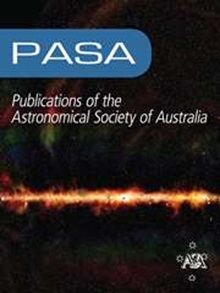RadioGalaxyNET: Dataset and Novel Computer Vision Algorithms for the Detection of Extended Radio Galaxies and Infrared Hosts
IF 4.6
3区 物理与天体物理
Q1 ASTRONOMY & ASTROPHYSICS
Publications of the Astronomical Society of Australia
Pub Date : 2023-12-11
DOI:10.1017/pasa.2023.64
引用次数: 0
Abstract
Creating radio galaxy catalogues from next-generation deep surveys requires automated identification of associated components of extended sources and their corresponding infrared hosts. In this paper, we introduce RadioGalaxyNET, a multimodal dataset, and a suite of novel computer vision algorithms designed to automate the detection and localization of multi-component extended radio galaxies and their corresponding infrared hosts. The dataset comprises 4,155 instances of galaxies in 2,800 images with both radio and infrared channels. Each instance provides information about the extended radio galaxy class, its corresponding bounding box encompassing all components, the pixel-level segmentation mask, and the keypoint position of its corresponding infrared host galaxy. RadioGalaxyNET is the first dataset to include images from the highly sensitive Australian Square Kilometre Array Pathfinder (ASKAP) radio telescope, corresponding infrared images, and instance-level annotations for galaxy detection.We benchmark several object detection algorithms on the dataset and propose a novel multimodal approach to simultaneously detect radio galaxies and the positions of infrared hosts.RadioGalaxyNET:用于探测扩展射电星系和红外宿主的数据集和新型计算机视觉算法
从下一代深度巡天中创建射电星系目录需要自动识别扩展源的相关成分及其相应的红外宿主。在本文中,我们介绍了多模态数据集 RadioGalaxyNET 和一套新颖的计算机视觉算法,旨在自动检测和定位多成分扩展射电星系及其相应的红外宿主。该数据集包括 2,800 幅具有射电和红外通道的图像中的 4,155 个星系实例。每个实例都提供了有关扩展射电星系类别、包含所有组成部分的相应边界框、像素级分割掩码以及相应红外宿主星系的关键点位置的信息。RadioGalaxyNET是第一个包含来自高灵敏度的澳大利亚平方公里阵列探路者(ASKAP)射电望远镜的图像、相应的红外图像和用于星系探测的实例级注释的数据集。我们在该数据集上对几种天体探测算法进行了基准测试,并提出了一种新颖的多模态方法来同时探测射电星系和红外宿主星系的位置。
本文章由计算机程序翻译,如有差异,请以英文原文为准。
求助全文
约1分钟内获得全文
求助全文
来源期刊
CiteScore
5.90
自引率
9.50%
发文量
41
审稿时长
>12 weeks
期刊介绍:
Publications of the Astronomical Society of Australia (PASA) publishes new and significant research in astronomy and astrophysics. PASA covers a wide range of topics within astronomy, including multi-wavelength observations, theoretical modelling, computational astronomy and visualisation. PASA also maintains its heritage of publishing results on southern hemisphere astronomy and on astronomy with Australian facilities.
PASA publishes research papers, review papers and special series on topical issues, making use of expert international reviewers and an experienced Editorial Board. As an electronic-only journal, PASA publishes paper by paper, ensuring a rapid publication rate. There are no page charges. PASA''s Editorial Board approve a certain number of papers per year to be published Open Access without a publication fee.

 求助内容:
求助内容: 应助结果提醒方式:
应助结果提醒方式:


